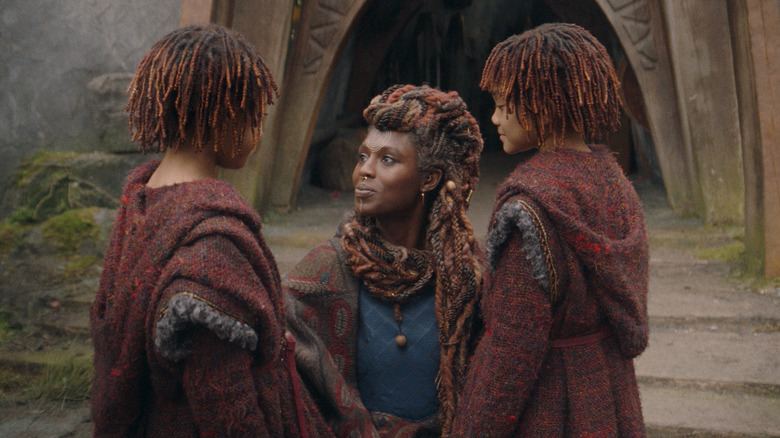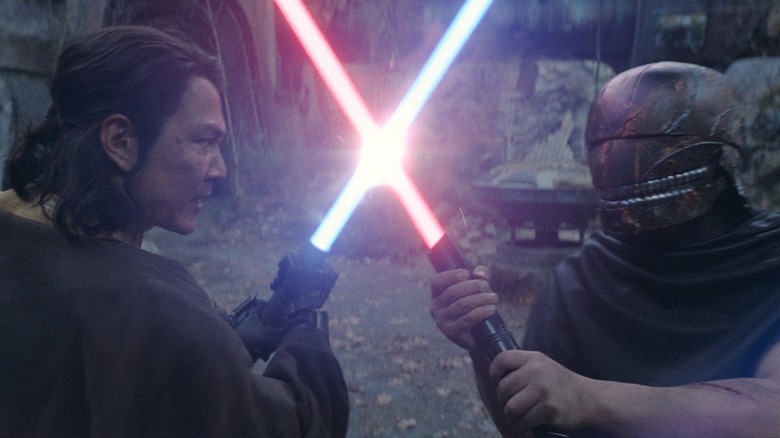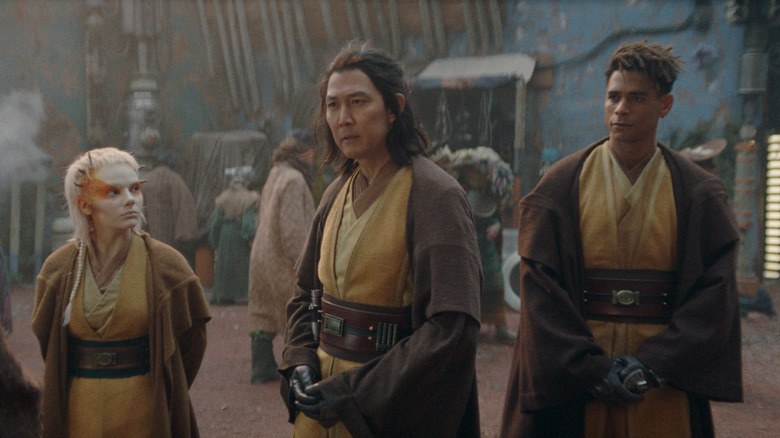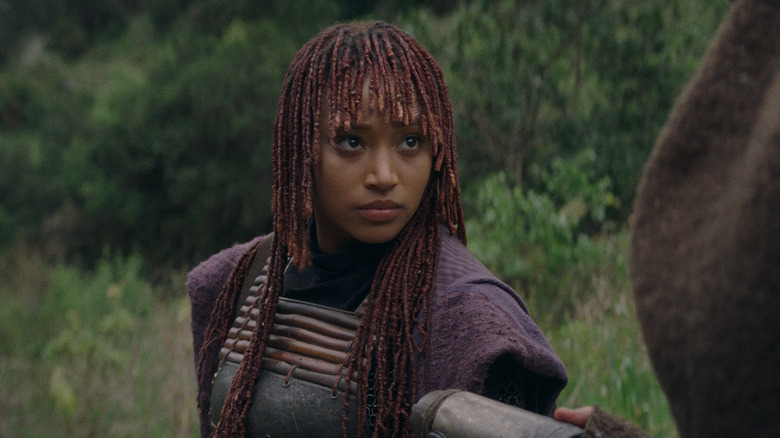The Acolyte's Cancellation Continues Disney's Biggest Star Wars Problem
This article contains spoilers for "Star Wars: The Acolyte"
We gather here today to mourn the passing of "Star Wars: The Acolyte," a show taken from us well before its time. In life, it faced many challenges — review-bombing, uneven writing, and the sweaty rage of the YouTube Grifter Bigot Industrial Complex. It wasn't a perfect show. Far from it, "The Acolyte" received a range of valid criticisms, from pacing issues to a lackluster first half. But by the end of its first (and now, only) season, it built real momentum. Manny Jacinto showed up and murdered half a dozen Jedi in some of the best lightsaber action the franchise has ever seen. There was lustful dark side seduction, a nuanced discussion of the Jedi Order, and a bunch of fantastic performances from the likes of Jodie Turner-Smith, Carrie-Anne Moss, and Lee Jung-jae.
Most importantly, though, "The Acolyte" gave us something new. New characters, new planets, new ideas and perspectives on a familiar universe, and a diverse cast and crew of new creatives lending their experiences and talent to the franchise. None of that will continue now, and it's a shame, but it also isn't the first time that Disney has cut the cord on a "Star Wars" project at the first sign of choppy waters.
Right-wing talking heads are already celebrating the end of a show that they previously ridiculed for daring to prioritize non-white, non-straight stories. It brings to mind the aftermath of "The Last Jedi," which sparked a similar firestorm among habitual malcontents. That backlash resulted in "The Rise of Skywalker," a film that tried so hard to be inoffensive that it came out just feeling bland. By canceling "The Acolyte," Disney could be falling into the same trap again.
The Acolyte fell victim to the modern streaming model
The instinct to cancel expensive streaming series after lackluster first-season viewership isn't a phenomenon unique to "Star Wars" or Disney+. It's become a pillar of the streaming business model. Shows like "Breaking Bad" that thrived for years on a traditional TV production model gave birth to the modern streaming landscape, turning "binge-watching" into a quarterly earnings bullet point. The irony is that original streaming series rarely last long enough to achieve the volume those shows needed to become binge-able in the first place. And for the few that do, ever-elongating production schedules and ballooning budgets mean fans are frequently waiting two years between eight-episode seasons.
None of this is conducive to the kind of expansive, interconnected worldbuilding that made "Star Wars" a global phenomenon to begin with. "The Phantom Menace" was panned by critics and many fans, and "Attack of the Clones" was maligned even more. But without George Lucas' perseverance and authorial determination to stick to his guns, "Star Wars" might have never become the kind of franchise worth $4 billion to Disney.
In the wake of "The Acolyte" getting canceled, fans on social media have suggested that "Star Wars: The Clone Wars" might never have seen a Season 2 either had it been made in the current streaming era. The beloved animated series got six seasons under Lucas and a seventh with Disney, but it struggled to find its identity in the early years, as many shows do.
A franchise like Star Wars needs room to make mistakes
While Disney has produced a ton of new "Star Wars" content since acquiring Lucasfilm a decade ago, the company has typically been hesitant to take big risks. "The Last Jedi" is one of the 20 highest-grossing movies of all time, but the polarizing reaction from a certain subset of fans urged the studio to embrace a safer, less original angle for "The Rise of Skywalker" — a decision that could not save that film from mediocrity. "The Clone Wars" took three or four seasons to really find its footing. Disney hasn't put out a theatrical "Star Wars" release since 2019, though many projects have been announced and then canceled.
The few strands that seem to have lasted tend to lean heavily on nostalgia. "The Mandalorian," which will carry the franchise back to cinemas in 2026, has been Disney's biggest streaming hit with the franchise, and it's become increasingly loaded with deepfakes, cameos, and return trips to Tatooine. The "Ahsoka" series, which is getting a Season 2, has some original ideas but is more focused on re-canonizing old EU plots and giving Hayden Christensen new lightsaber choreography. I can't fault Lucasfilm for the latter — I mean, it's Hayden — and hey, Thrawn is a compelling villain. There's "Skeleton Crew" coming later this year. "Andor" Season 2 is around the corner.
"Star Wars" isn't devoid of new angles or quality stories, but the sense of timidness remains. And when canceling a promising project also emboldens the "fans" to harass its Black, queer star? It feels like pandering to a mob that doesn't actually want to be won over.
Cancellations can cost more in the long run
We can talk all day about why "The Acolyte" was canceled. It lost viewers as the season went on despite a strong start. A vocal minority of haters dominated the discourse until Qimir's arms drowned them out (rightly so). Etc. etc. But the more important figure may be an older one — specifically, one from a 2022 YouGov survey on streaming tendencies. Among other things, the study analyzed how the high risk of premature cancellations prevents people from getting invested in shows to begin with. Nearly half of the adults surveyed said they'd likely wait until a show was completely finished before starting it, fearing the story would get cut off in the middle.
Every streaming subscriber today knows that anxiety. Look to your left, look to your right, neither of those shows will likely be here next fall. In a singular franchise like "Star Wars," the damage may be even greater. What's the effect on canon if planned stories don't follow through? How does the universe expand and develop if we keep starting over from square one?
There is such a thing as being too protective of an IP, like that fancy maple syrup you're so afraid to use that it goes rotten in the back of the fridge. In the case of "The Acolyte," Disney is likely more interested in quarterly margins than the preservation of sci-fi lore. But when that lore is the reason people keep showing up for the franchise you paid billions of dollars for, the same tactics of short-term risk-cutting can cause more harm than good. Fear leads to stagnation, and while I still love "Star Wars," we all suffer when new ideas don't get the time to figure themselves out.



